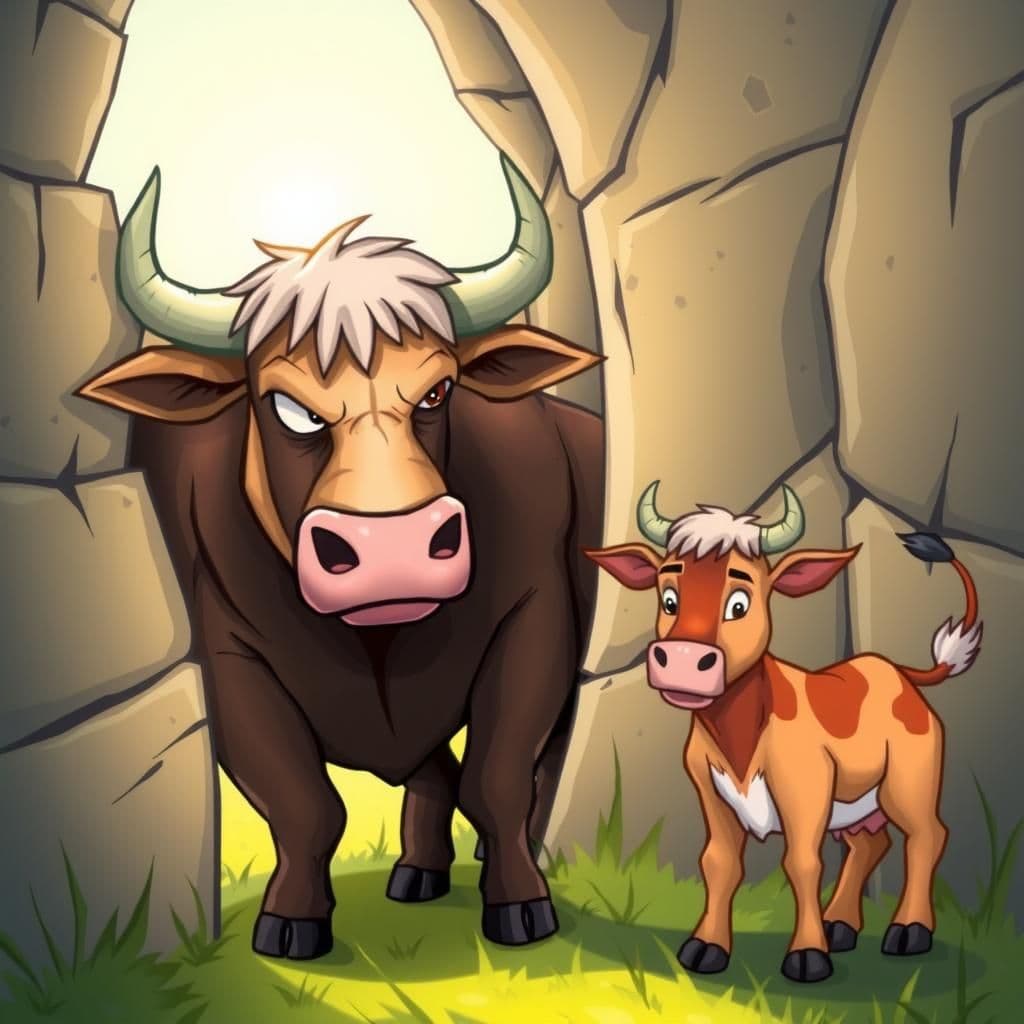The Bull and the Calf

Story Summary
In "The Bull and the Calf," a classic short moral story, an experienced Bull struggles to navigate a narrow passage to his stall. When a young Calf offers to help, the Bull arrogantly dismisses him, claiming he knows the way better than the Calf, highlighting a timeless lesson about the value of humility and accepting guidance. This tale serves as an engaging example of moral stories for young readers, teaching important life lessons.
Click to reveal the moral of the story
Experience often knows the way better than youthful enthusiasm.
Historical Context
This fable, often attributed to Aesop, reflects themes of wisdom and experience versus youthful enthusiasm and naivety, common in ancient Greek storytelling. Aesop's fables were designed to impart moral lessons through simple narratives featuring animals, and this particular tale emphasizes the value of experience over inexperience, a prevalent theme in various cultures' folklore. The story has been retold in numerous forms, illustrating the timelessness of its moral.
Our Editors Opinion
This story highlights the value of experience and wisdom over youthful enthusiasm, a lesson that resonates in today's fast-paced world where we often overlook the insights of those who have been through similar challenges. For instance, in a workplace scenario, a seasoned employee might choose to approach a complex project based on years of accumulated knowledge, rather than relying on the untested ideas of a new intern who is eager to innovate but lacks the context needed for effective decision-making.
You May Also Like

The Olive Tree and the Fig Tree
In "The Olive Tree and the Fig Tree," a classic among famous moral stories, the Olive Tree ridicules the Fig Tree for shedding its leaves with the seasons. However, when heavy snow falls, the Olive's lush branches break under the weight, leading to its demise, while the bare Fig Tree remains unharmed. This popular moral story illustrates that what may seem like a disadvantage can sometimes be a blessing, making it a valuable lesson in short moral tales and bedtime moral stories.

The Mountain and the Mouse
In "The Mountain and the Mouse," a mountain's dramatic labor attracts a crowd from seven cities, all eagerly awaiting a grand event. Instead, a humble Mouse emerges, prompting mockery from the onlookers, but it confidently claims expertise in diagnosing volcanic activity. This short moral tale serves as a reminder that true wisdom can come from unexpected sources, a theme often found in timeless moral stories for kids.

The Fly and the Ant
In "The Fly and the Ant," a classic tale from folklore, the boastful fly highlights its glamorous lifestyle and the attention it receives in palaces, while the diligent ant emphasizes the merits of hard work and planning for the future. This short story with moral teaches that vanity is fleeting and often leads to danger, contrasting the superficial allure of the fly with the ant's industriousness and foresight. Ultimately, the moral stories written in this narrative remind us that true security comes from effort and preparation, not from idle boastfulness.
Other names for this story
"Wise Bull, Young Calf", "Bull's Stubborn Journey", "Calf's Guide to Wisdom", "Narrow Passage Lessons", "Bull vs. Calf: A Tale", "The Bull's Dilemma", "Calf's Advice Rejected", "Old Bull, Young Calf"
Did You Know?
This fable highlights themes of experience versus youth, emphasizing that wisdom often comes with age and that those who are older may have valuable knowledge that younger individuals cannot easily replicate. It serves as a reminder that sometimes, the solutions to our problems are known to us, even if they seem elusive at first.
Subscribe to Daily Stories
Get a new moral story in your inbox every day.